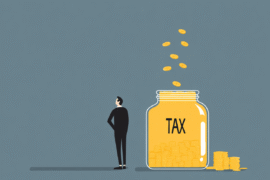This article may contain references to products or services from one or more of our advertisers or partners. We may receive compensation when you click on links to those products or services. Nonetheless, our opinions are our own.
The information presented in this article is accurate to the best of our knowledge at the time of publication. However, information is subject to change, and no guarantees are made about the continued accuracy or completeness of this content after its publication date.
After an overwhelming experience of a car crash, seeing an insurance check with your name on it can feel like the best thing that can happen during this difficult situation. The initial shock is wearing off, and the reality of medical bills and car repairs is setting in. That check looks like a quick solution, a first step toward putting the incident behind you. It’s a tangible form of relief in a time of great stress.
However, many people in this exact situation make a critical financial and legal mistake. In their haste to get back to normal, they accept and cash that first offer without understanding the full implications. What seems like a helping hand from the insurance company is often a strategic move designed to limit their financial liability. Cashing that check is rarely just about depositing funds; it’s about agreeing to a settlement.
This decision can have lasting consequences, costing victims thousands, or even hundreds of thousands, of dollars in the long run. New injuries can surface, long-term care needs can arise, and the full scope of the financial damage may not be apparent for weeks or months. Before you endorse that check, understand what you might be giving up.
What Happens When You Cash That Check?
Quick Answer:
Cashing the first insurance check after a car accident can close your claim permanently. Once you cash it, you give up the right to future compensation—even if new injuries appear. Always consult a personal injury lawyer before accepting any payment.
Cashing a check from an insurance company after an accident is rarely a simple transaction. In most personal injury cases, that payment is tied to a settlement agreement, whether you realize it or not. By depositing the check, you are legally accepting the insurer’s offer as full and final payment for your claim.
You Waive Your Right to Future Compensation
The most significant consequence of cashing that check is that you forfeit your right to seek any further compensation for the accident. It doesn’t matter if your injuries worsen, if a new injury related to the crash is discovered by your doctor, or if you need more extensive medical treatment than you initially anticipated. Once the check is cashed and the attached release is legally binding, the case is closed.
For example, you’re in a rear-end collision and experience some neck soreness. The other driver’s insurance company quickly offers you $5,000 to cover your emergency room visit and a few days of missed work. It seems reasonable, so you cash the check.
A month later, the soreness has evolved into chronic pain, and an MRI reveals two herniated discs in your neck requiring surgery and extensive physical therapy. The cost of this treatment, plus the income you’ll lose while recovering, far exceeds the initial $5,000.
However, because you accepted the settlement, you can no longer ask the insurance company for another dime. You are now personally responsible for all future costs.
The Liability Release: A Binding Contract
Often accompanying the check is a document called a “Release of All Claims” or a “Liability Release Form.” Signing this document, or simply cashing the check, which often has language on the back indicating it serves as an acceptance of the release, legally absolves the at-fault party and their insurance company from any future liability related to the accident.
This is a legally binding contract. Many people overlook the fine print or fail to grasp its finality. Victims think they are just acknowledging receipt of a partial payment when signing such an agreement. Sometimes, insurance adjusters may even downplay the document’s significance, presenting it as a standard piece of paperwork.
However, the reality is that this release is the insurance company’s primary tool for closing cases quickly and cheaply. Once it’s executed, there is almost no legal recourse to reopen the claim.
Why Insurance Companies Act So Quickly
An insurance company’s rapid response with a settlement offer might seem like excellent customer service, but it’s a calculated business strategy. Insurers are for-profit businesses, and their goal is to resolve claims for the lowest possible amount. One of their most effective strategies for doing so is a fast settlement.
It’s a Strategy, Not Generosity
The urgency of the offer is intended to catch you off guard. Immediately following a wreck, you are probably reeling, hurting, and anxious about rising costs. The promise of instant cash can be very appealing. The insurer knows this and capitalizes on your desire for a quick resolution. They want to settle before you have had the chance to:
- Consult with an attorney: A personal injury lawyer can assess the true value of your claim and advise you against accepting a lowball offer.
- Understand the full extent of your injuries: Many serious injuries are not immediately apparent.
- Calculate your total damages: This includes not just current bills but future medical needs, lost wages, and pain and suffering.
By settling quickly, the insurance company locks in a low payout and protects itself from the potentially much larger costs that could emerge as the true impact of the accident becomes clear.
Some of the most common and debilitating injuries from car accidents have delayed-onset symptoms. This means it can take days, weeks, or even months for the full extent of the physical and emotional trauma to manifest. These include:
- Whiplash and Soft Tissue Injuries: Neck and back stiffness might seem minor at first, but can develop into chronic pain, headaches, and limited mobility.
- Traumatic Brain Injuries (TBIs): A concussion often starts as headache or dizziness, but can lead to long-term cognitive difficulties, memory problems, and emotional changes.
- Back Trauma: A minor ache can escalate into a serious issue like a herniated disc or spinal stenosis, potentially requiring surgery.
- Emotional and Psychological Distress: Post-Traumatic Stress Disorder (PTSD), anxiety, and depression often develop over time as the victim processes the traumatic event.
Insurance companies are well aware of this medical reality. Their strategy is to finalize a settlement before these latent injuries surface and dramatically increase the value of your claim.
Voted "Best Overall Budgeting App" by Forbes and WSJ
Monarch Money helps you budget, track spending, set goals, and plan your financial future—all in one app.
Get 50% OFF your first year with code MONARCHVIP
The True Cost of a Car Crash
To understand why a quick settlement is so dangerous, you must appreciate the full spectrum of damages you may be entitled to recover. The initial offer from an insurance company rarely, if ever, accounts for the complete financial, physical, and emotional toll of an accident.
A comprehensive personal injury claim should consider all of the following:
- Current and Future Medical Expenses: This includes everything from the initial emergency room visit to ongoing physical therapy, future surgeries, prescription medications, and necessary medical equipment.
- Lost Income: If you miss work due to your injuries, you are entitled to compensation for those lost wages.
- Loss of Future Earning Capacity: If your injuries are severe enough to prevent you from returning to your previous job or working at the same capacity, you can claim damages for the reduction in your future earnings.
- Pain and Suffering: This is compensation for the physical pain and emotional distress you have endured because of the accident. While it is non-economic, it is a very real and significant component of a personal injury claim.
- Property Damage: This covers the cost of repairing or replacing your vehicle and any other personal property damaged in the crash.
- Permanent Impairment or Disfigurement: If the accident results in a permanent disability, scarring, or other long-term physical changes, you are entitled to substantial compensation.
The damages are not always obvious on day one. Calculating these long-term costs requires a thorough medical and legal assessment, which is why rushing into a settlement is a gamble you should not take.
What You Should Do Instead
If you were involved in an accident and a company has written you a check, what you do next is very important. Avoiding the urge to deposit it right away can save your rights and your wallet.
1. Consult a Doctor First
Your own health must be your top priority. Even if you’re feeling okay, have a thorough medical examination by a physician. Explain the accident and note each and every symptom, however insignificant it may appear. This medical record is important for two reasons:
- It ensures you receive the proper treatment for any underlying injuries before they worsen.
- It makes an official record associating your injuries directly with the accident, which is important to your insurance claim.
2. Do Not Sign or Cash Anything
Do not sign any documents from the insurance company, and do not cash any checks they send you without first seeking legal help. Remember, cashing the check is often legally equivalent to signing a settlement release. Politely inform the insurance adjuster that you are not prepared to discuss a settlement until you have a full understanding of your medical prognosis and have spoken with an attorney.
3. Contact a Personal Injury Attorney
This is the most important step you can take to protect yourself. A qualified personal injury attorney can handle all communications with the insurance company on your behalf. They will:
- Carry Out an Impartial Investigation: Save evidence, interrogate witnesses, and establish a strong case.
- Value Your Claim Fully: Consult with medical professionals and finance analysts to compute your entire past, current, and future damages.
- Negotiate with the Insurance Company: Use their expertise to battle for a reasonable and complete settlement that meets all your requirements.
- File a Lawsuit if Necessary: If the insurance company refuses to offer a fair settlement, your attorney will be prepared to take your case to court.
Hiring an attorney levels the playing field. Insurance companies are experts in negotiation and law; you need an expert on your side, too.
Protect Your Future, Not Just Your Present
That first insurance check may offer a moment of financial relief, but it’s a short-term solution that can lead to long-term regret. Accepting it means you are trusting the at-fault party’s insurer to have your best interests at heart; a trust that is almost always misplaced.
Pursuing the full compensation you deserve is not being greedy. Instead, it ensures that you, not the insurance company, are protected from the future financial burdens of an accident you did not cause.
Before you cash that check and cash out your rights, pause. Make the informed choice to seek professional medical and legal advice. Your future self will thank you.
Frequently Asked Questions About Insurance Checks After an Accident
1. Can I return an insurance check after I’ve cashed it?
Unfortunately, no. Once you’ve cashed the check, it’s typically considered acceptance of the settlement, and the case is closed. Even if you later discover new injuries or higher repair costs, you likely cannot reopen the claim.
2. What if I already signed a release but haven’t deposited the check yet?
If you signed a release form, you’ve likely waived your right to pursue further compensation, even if you haven’t cashed the check. Contact a personal injury attorney immediately to see if the agreement can still be challenged, especially if it was signed under pressure or without full disclosure.
3. How long should I wait before accepting a settlement offer?
You should never accept or cash a settlement check until you’ve completed medical treatment or reached what’s called maximum medical improvement (MMI), the point where your condition has stabilized. This ensures all future costs are included in your claim.
4. Can a lawyer negotiate a higher settlement after I’ve already been offered a check?
Yes, as long as you haven’t signed or cashed it yet. Once you consult a lawyer, they can reopen negotiations, assess the true value of your case, and often secure a significantly higher payout that covers all your medical and emotional damages.

Reviewed and edited by Albert Fang.
See a typo or want to suggest an edit/revision to the content? Use the contact us form to provide feedback.
At FangWallet, we value editorial integrity and open collaboration in curating quality content for readers to enjoy. Much appreciated for the assist.
Did you like our article and find it insightful? We encourage sharing the article link with family and friends to benefit as well - better yet, sharing on social media. Thank you for the support! 🍉
Article Title: Don’t Cash That Insurance Check Yet: What Most Drivers Miss (2025 Guide)
https://fangwallet.com/2025/11/18/what-most-drivers-miss/The FangWallet Promise
FangWallet is an editorially independent resource - founded on breaking down challenging financial concepts for anyone to understand since 2014. While we adhere to editorial integrity, note that this post may contain references to products from our partners.
The FangWallet promise is always to have your best interest in mind and be transparent and honest about the financial picture.
Become an Insider

Subscribe to get a free daily budget planner printable to help get your money on track!
Make passive money the right way. No spam.
Editorial Disclaimer: The editorial content on this page is not provided by any of the companies mentioned. The opinions expressed here are the author's alone.
The content of this website is for informational purposes only and does not represent investment advice, or an offer or solicitation to buy or sell any security, investment, or product. Investors are encouraged to do their own due diligence, and, if necessary, consult professional advising before making any investment decisions. Investing involves a high degree of risk, and financial losses may occur including the potential loss of principal.
Source Citation References:
+ Inspo
There are no additional citations or references to note for this article at this time.












































